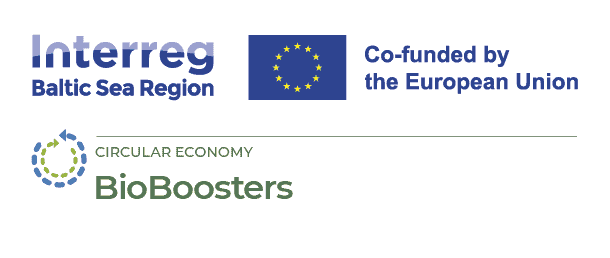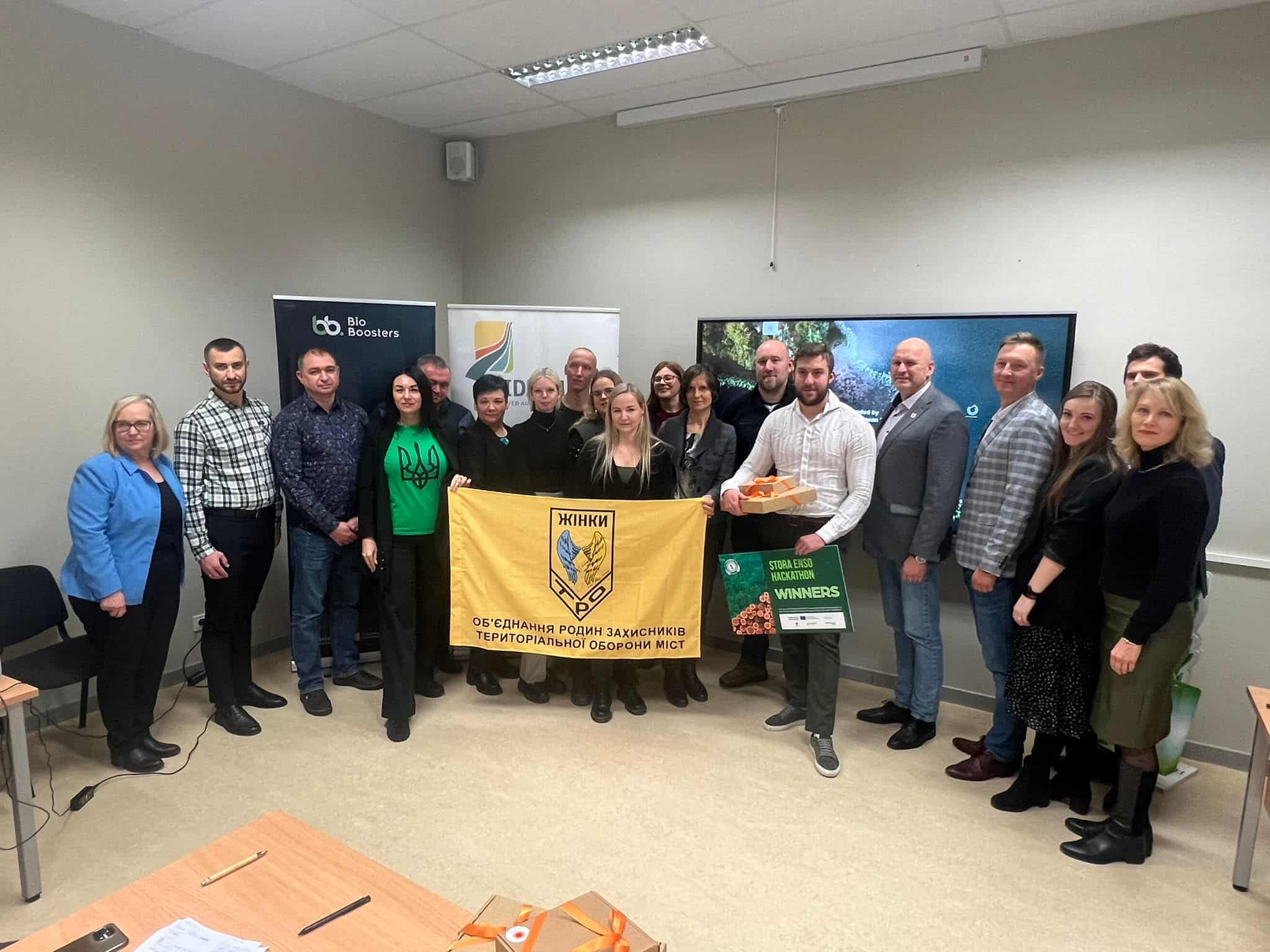
The story about Stora Enso Hackathon
02 January 2025
On December 5th and 6th, companies and research institutes from Latvia, Finland, Ukraine, Turkey, and Sweden gathered in Vidzeme University of Applied Sciences in Valmiera, Latvia and online to address Stora Enso’s challenges of sustainability and circularity. The hackathon focused on developing innovative, eco-friendly solutions to combat blue stain in sawn logs and wood-damaging insects — all while ensuring water conservation. With ambitious goals to enhance water stewardship and reduce process water discharges, Stora Enso reaffirmed its commitment to transforming the forestry sector for a more sustainable future.
About Stora Enso
Stora Enso, a Finnish-Swedish leader in renewable packaging, biomaterials, and wooden construction, operates across Europe, Asia, and the USA, focusing on sustainability and the circular bioeconomy. By leveraging renewable resources like wood, the company drives innovation while promoting responsible forestry and reducing carbon emissions.
In Latvia, Stora Enso runs the Launkalne Sawmill in Smiltene municipality, processing 500,000 m³ of logs annually into sawn timber, ThermoWood, granules, and biomass. Half of its 260,000 m³ of sawn timber remains in the Baltic region, with the rest exported globally.
Accelerating the transition to a circular bioeconomy
Circularity is central to Stora Enso’s sustainability efforts, focusing on waste reduction, resource efficiency, and recycling. The company champions a circular bioeconomy through sustainable forestry, a reduced environmental footprint, and improved recycling infrastructure.
Water stewardship is a key priority, with goals to reduce process water discharges per saleable ton by 17% by 2030 (2019 baseline) and further cut total water withdrawal (2016 baseline). These efforts aim to minimize environmental impact while enhancing operational efficiency and lowering costs.
Stora Enso faces two key challenges during the summer to maintain wood quality: preventing blue stain caused by fungi and combating wood-boring insects. Blue stain damages the appearance and quality of wood, with watering logs as the primary solution – a process that accounted for over half of Launkalne Sawmill’s water usage in recent years (76% in 2023). The company is exploring environmentally friendly alternatives to reduce water consumption while preventing blue stain. Additionally, wood-boring insects increase significantly in warmer months, degrading wood quality and doubling the amount of low-grade logs. Stora Enso aims to address both issues with sustainable, eco-friendly solutions to protect wood, reduce water use, and manage pest damage effectively.
Collaborative Solutions
A total of nine companies applied to participate in the hackathon, but only six were selected, each bringing a unique perspective to solving the challenges.
- Good Bugs (Latvia): Proposed using beneficial insects and fungi that are natural enemies of bark beetles.
- State Forest Resources Agency (Ukraine): Offered an integrated pest management (IPM) strategy combining biological control methods, such as natural predators and beneficial insects, with early detection and monitoring systems.
- Woolherd (Finland): Presented Woolherd Biowool, an innovative product made from surplus wool, which enhances water efficiency in wood manufacturing processes.
- KAGON (Sweden): Offered ProLog 3, a weather-controlled irrigation system designed to optimize water use in sawmills and pulp industries.
- SLU & Silava (Latvia and Sweden): Proposed using field and sawmill studies to determine where insects primarily colonize harvested wood by monitoring log yards, both in forests and sawmills, using traps and visual inspections to assess insect activity levels and patterns.
- Crop Genius (Turkey): Introduced the Kemursgen Mapping & Monitoring System, an AI-driven solution to safeguard storage areas from wood-boring pests.
A Win-Win Outcome
For Stora Enso, the hackathon offered more than innovative solutions – it was an eye-opening experience. “Receiving the invitation to join the hackathon was a fantastic opportunity to expand our knowledge and gain fresh ideas,” said Uldis Deisons, Director of Stora Enso Wood Products at Launkalne Mill. “We’re inspired not just to implement the winning team’s idea but to explore concepts from other teams as well. The outcome exceeded our expectations. I really encourage other companies to participate in similar events.”
The hackathon concluded with KAGON AB emerging as the winner. Their ProLog 3.0 system offers a professional, weather-adapted, and demand-controlled irrigation solution for sawmills, timber terminals, and pulp industries. This cutting-edge technology, developed through years of collaboration with the sawmill and pulp sectors, ensures both environmental sustainability and effective raw material protection.
ProLog 3.0 is recognized by environmental authorities as a sustainable technology for sawmills and pulp mills, making monitoring flexible and user-friendly. “Participating in the hackathon as a supplier is a valuable experience,” said Daniel Otterbeck of KAGON AB. “It provides an opportunity to engage directly with decision-makers, explore diverse solutions, and broaden perspectives. Coming prepared with a well-tested idea is crucial to making an impact.”
Importance for Vidzeme Planning Region
The Stora Enso Hackathon also underscored the pivotal role of the forest-based industry in the Vidzeme region’s economy. “This sector is the cornerstone of prosperity for our residents, industries, and SMEs,” said Laila Gercāne, Head of the Development and Projects Department in Vidzeme Planning Region. “Its growth and development are vital for the well-being and economic sustainability of our community.”
“This marks the 2nd year of implementing the BioBoosters Model Hackathons in Latvia and Vidzeme, and we are pleased to see that they are steadily gaining recognition and credibility among both the Challenge Providers and the teams that participate. The growing interest from international teams in addressing the challenges faced by the Vidzeme planning region is particularly encouraging. Notably, this year’s challenge from Stora Enso has proven to be significant to the broader wood industry, drawing considerable anticipation for its outcomes,” Inguna Kucina, an expert of the BioBoosters project in the Vidzeme planning region, revealed. “Organizing this year’s hackathons was notably smoother, thanks to the valuable experience gained from the nine successful events held last year, which delivered tangible results and greatly expanded our network of collaborators. However, each year presents a unique set of challenges for the organizers, as the conditions and dynamics shift with every new sector and problem addressed”.
By fostering collaboration and innovation, the Stora Enso Hackathon has set a benchmark for sustainable practices in forestry, offering transformative solutions that promise lasting benefits for both the industry and the environment.
BioBoosters Hackathon: Reflections on Year Two and Key Developments
Organizing the BioBoosters Hackathon for the 2nd consecutive year has proven more efficient, thanks to analysis of last year’s outcomes and improvements made based on participant feedback. Last year’s focus was on the food industry, this year’s attention turned to the wood industry – while the sectors are quite different, it was confirmed that the BioBoosters hackathon model works well across diverse fields. What sets this year apart is the nature of the challenge itself. It quickly became evident that the need for a solution in the wood industry is urgent and widespread. Conversations with companies and research institutes revealed a consistent message: they were eager to find that “unicorn”—an innovative solution that could solve a longstanding problem.
The success of the BioBoosters model hinges on strong partnerships and an extensive network of collaborators, who play a critical role in identifying potential solution providers. Without their support, reaching international companies, like this year’s winning team (who had successfully tested their product in Scandinavia but was less known in the Baltics), would have been challenging. This year also brought new experiences, particularly in the realm of active scouting. It allowed to attract participants beyond the Baltic Sea region, increasing the overall quality of collaboration. Partners were more strategic in their search for potential solutions, ensuring a more targeted approach. Unlike previous hackathons where the focus was primarily on engaging management and decision-makers, this year it was crucial to connect with individual researchers or company representatives directly working on the specific challenges. This proved to be more difficult but ultimately more valuable.
A major change this year was how we structured the relationship between mentors and teams. Unlike last year, when teams were supported by a pair of mentors, we gave each team a dedicated time with one mentor for more focused guidance. Additionally, while the teams remained highly international, the mentors this year were predominantly local. This setup proved beneficial, as mentors with expertise in the local wood industry provided more tailored, context-specific guidance, especially regarding the Latvian market.
Vidzeme Planning Region has been organizing hackathons in various formats and for different target audiences. While not all elements of the BioBoosters model have been replicated, many aspects have inspired other initiatives. One key takeaway from the past two years is that the hackathon format excels at quickly connecting companies with solution providers and ready-to-market products. It also provides a platform for innovative ideas that may need further data and testing before they can be implemented. We look forward to continuing our collaboration with the BioBoosters partner network, as it remains integral to the ongoing success of this model.
Interactive map showing pilot locations. Use the arrow keys to move the map view and the zoom controls to zoom in or out. Press the Tab key to navigate between markers. Press Enter or click a marker to view pilot project details.






